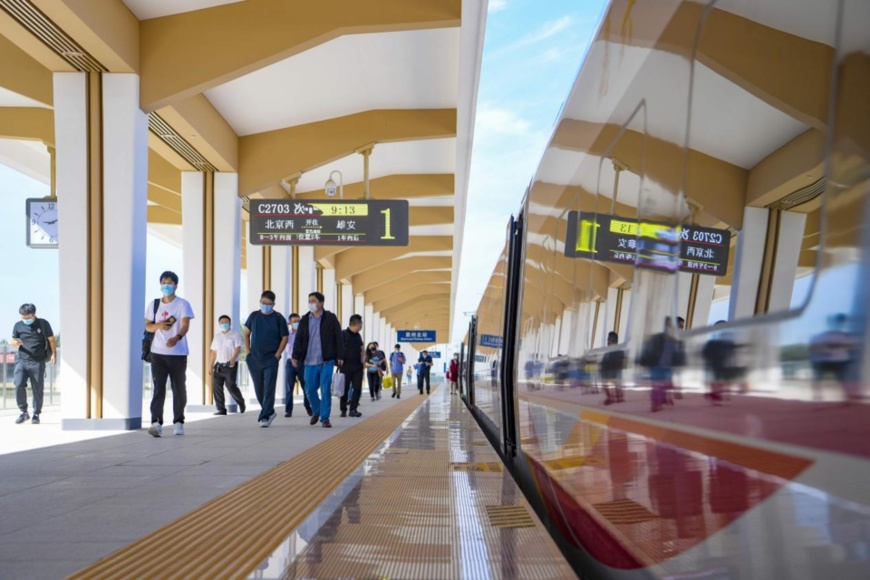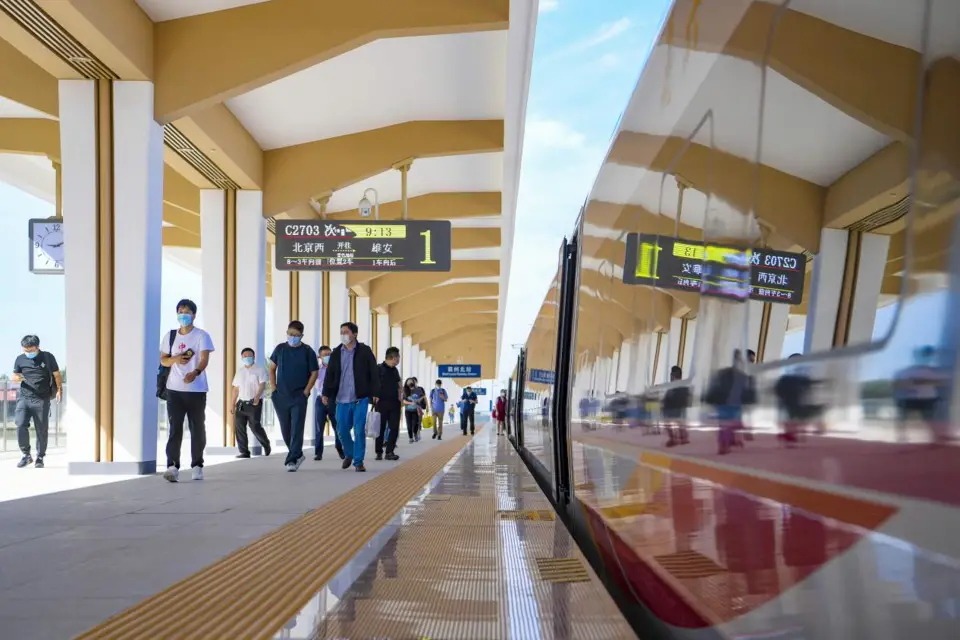By Zhang Zhifeng, People’s Daily

Photo taken on August 31 shows passengers getting ready to get on a high-speed train that runs between Beijing and Xiong’an New Area in north China’s Hebei province. (Photo by Sun Lijun/People’s Daily Online)
Since the establishment of Xiong’an New Area in north China’s Hebei province, the ecological environment of Baiyangdian Lake in the area has been improved at a fast pace, which mirrors the advantages and strengths of the new area in pursuing green development.
Besides clearer water and increasing number of birds, the overall water quality of Baiyangdian Lake was also elevated from below Grade V in 2017 to Grade IV in 2020, and the average water quality of core areas of the lake has reached Grade III (good quality), according to a report on the progress made by Xiong’an New Area and Baiyangdian Lake in pushing ahead with ecological protection released by the State Council of China.
As China has entered a new development stage, it is both a definite requirement and a general trend to prioritize ecological conservation, boost green development, and advance high-level protection of the ecological environment while promoting high-quality economic development through coordinated efforts.
A good ecological environment is believed to be one of the prominent strengths of Xiong’an New Area in the future. Lucid waters and lush mountains are invaluable assets, and Xiong’an New Area needs to realize its value and enhance its appeal by relying on a sound ecological environment, said Xi Jinping, general secretary of the Communist Party of China (CPC) Central Committee, while visiting the new area on Jan. 16, 2019.
Green modes of production, lifestyles and a sound ecology are expected to make Xiong’an more capable of taking on Beijing’s non-capital functions.
Xiong’an New Area has a good ecology since it came into being. Dubbed the “kidney” of northern China, the Baiyangdian Lake serves as an ecological barrier of the area. Established because of the lake and built along the lake, Xiong’an New Area has made ecological restoration and conservation of Baiyangdian Lake one of its priorities since its establishment.
A whole package of measures have been taken to restore and protect the ecological environment of Baiyangdian Lake, including thoroughly treating 606 polluted ponds, establishing and improving sewage treatment facilities in over 70 villages located in or near the lake, and diverting water to the lake under China’s South-to-North Water Diversion Project and from upstream reservoirs, which have injected new vitality into Baiyangdian Lake, or the “pearl of north China”.
The ecological strength of Xiong’an New Area is also manifested in the planning and construction of the area. Today, the proportion of green and blue spaces in the area stands at 70 percent, signaling a beautiful blueprint for the development of the new area.
Over the past more than four years, a large area of trees has extended across Xiong’an New Area under the Millennium Forest Project, not only forming a magnificent landscape, but becoming a green fortress for carbon emission reduction.
Green development is an inevitable path for Xiong’an to building a national model for high-quality development in the new era and an innovative development demonstration zone for the implementation of China’s new development concept - innovative, coordinated, green, open and shared development.
Xiong’an New Area, which has been built from scratch, has some late-mover advantages. It has promoted the design, construction and operation of green buildings, with new residential buildings in its starting area reducing energy use by more than 75 percent and new government-invested and large public buildings implementing three-star standard of green building, the highest level in China’s building rating system.
The citizen service center of Xiong’an New Area, which is among the first batch of buildings constructed at the new area, is a prefabricated building that can be reused. Besides, it achieves heating and cooling through natural energy conversion, thus saving energy as much as possible.
The recently delivered Xiong’an business service center, one of the first batch of jobs-housing integrated parks built to take on Beijing’s functions nonessential to its role as a capital city, has adopted over 100 green building technologies, showing concrete implementation of the concept of green development in terms of both theory and practice.
Since its establishment, Xiong’an New Area has shut down a number of workshops that caused pollution, exhibiting its resolute determination to follow a green development path.
Xiong’an New Area also plans to build safe and comfortable pedestrian and bicycle lanes to encourage green and low-carbon travel. Bus services account for 80 percent of transportation services at the starting area of Xiong’an New Area.
Since the citizen service center in Xiong’an New Area was established, people are required to transfer to electric automobiles to get in and out of the citizen service center.
A number of parks, including the Xiong’an Jiaoye Park and Swan Lake Wetland Park, have already been built, becoming must-visit destinations for local residents and visitors from other parts of China.
Xiong’an New Area has vividly demonstrated that a sound natural environment is universally beneficial welfare.
Besides clearer water and increasing number of birds, the overall water quality of Baiyangdian Lake was also elevated from below Grade V in 2017 to Grade IV in 2020, and the average water quality of core areas of the lake has reached Grade III (good quality), according to a report on the progress made by Xiong’an New Area and Baiyangdian Lake in pushing ahead with ecological protection released by the State Council of China.
As China has entered a new development stage, it is both a definite requirement and a general trend to prioritize ecological conservation, boost green development, and advance high-level protection of the ecological environment while promoting high-quality economic development through coordinated efforts.
A good ecological environment is believed to be one of the prominent strengths of Xiong’an New Area in the future. Lucid waters and lush mountains are invaluable assets, and Xiong’an New Area needs to realize its value and enhance its appeal by relying on a sound ecological environment, said Xi Jinping, general secretary of the Communist Party of China (CPC) Central Committee, while visiting the new area on Jan. 16, 2019.
Green modes of production, lifestyles and a sound ecology are expected to make Xiong’an more capable of taking on Beijing’s non-capital functions.
Xiong’an New Area has a good ecology since it came into being. Dubbed the “kidney” of northern China, the Baiyangdian Lake serves as an ecological barrier of the area. Established because of the lake and built along the lake, Xiong’an New Area has made ecological restoration and conservation of Baiyangdian Lake one of its priorities since its establishment.
A whole package of measures have been taken to restore and protect the ecological environment of Baiyangdian Lake, including thoroughly treating 606 polluted ponds, establishing and improving sewage treatment facilities in over 70 villages located in or near the lake, and diverting water to the lake under China’s South-to-North Water Diversion Project and from upstream reservoirs, which have injected new vitality into Baiyangdian Lake, or the “pearl of north China”.
The ecological strength of Xiong’an New Area is also manifested in the planning and construction of the area. Today, the proportion of green and blue spaces in the area stands at 70 percent, signaling a beautiful blueprint for the development of the new area.
Over the past more than four years, a large area of trees has extended across Xiong’an New Area under the Millennium Forest Project, not only forming a magnificent landscape, but becoming a green fortress for carbon emission reduction.
Green development is an inevitable path for Xiong’an to building a national model for high-quality development in the new era and an innovative development demonstration zone for the implementation of China’s new development concept - innovative, coordinated, green, open and shared development.
Xiong’an New Area, which has been built from scratch, has some late-mover advantages. It has promoted the design, construction and operation of green buildings, with new residential buildings in its starting area reducing energy use by more than 75 percent and new government-invested and large public buildings implementing three-star standard of green building, the highest level in China’s building rating system.
The citizen service center of Xiong’an New Area, which is among the first batch of buildings constructed at the new area, is a prefabricated building that can be reused. Besides, it achieves heating and cooling through natural energy conversion, thus saving energy as much as possible.
The recently delivered Xiong’an business service center, one of the first batch of jobs-housing integrated parks built to take on Beijing’s functions nonessential to its role as a capital city, has adopted over 100 green building technologies, showing concrete implementation of the concept of green development in terms of both theory and practice.
Since its establishment, Xiong’an New Area has shut down a number of workshops that caused pollution, exhibiting its resolute determination to follow a green development path.
Xiong’an New Area also plans to build safe and comfortable pedestrian and bicycle lanes to encourage green and low-carbon travel. Bus services account for 80 percent of transportation services at the starting area of Xiong’an New Area.
Since the citizen service center in Xiong’an New Area was established, people are required to transfer to electric automobiles to get in and out of the citizen service center.
A number of parks, including the Xiong’an Jiaoye Park and Swan Lake Wetland Park, have already been built, becoming must-visit destinations for local residents and visitors from other parts of China.
Xiong’an New Area has vividly demonstrated that a sound natural environment is universally beneficial welfare.
 Menu
Menu
 Green development gives impetus to China’s Xiong’an New Area
Green development gives impetus to China’s Xiong’an New Area
















